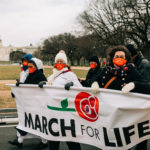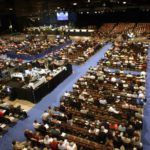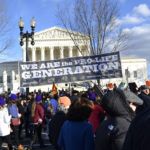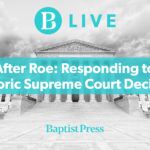
EDMOND, Okla. (BP) – Mention King David’s exhortation on God’s hand in developing him in his mother’s womb, and Josiah Presley comes to life.
“God, you formed my inmost parts. You knit me together in my mother’s womb. I praise you for I am fearfully and wonderfully made. Wonderful are your works. My soul knows it very well,” rolls from Presley’s tongue as if always on the tip. “Psalm 139, that’s been really impactful for me over the years.”

Nearly three decades ago in South Korea, when Presley was a scant six to eight weeks in utero, God continued to develop Presley after his mother received a dilation and curettage (D&C) abortion. A D&C dilates the cervix, scrapes the lining of the uterus and suctions out its contents, in a preponderous of cases removing the developing embryo that is typically about the size of a raspberry.
“My frame was not hidden from you when I was made in secret,” Presley continues the psalm, “when I was woven in the depth of the earth.”
So rare was Presley’s survival that a medical study involving 65,045 first trimester abortions performed in 1978 revealed that 45 embryos survived the procedure, leading to one healthy full-term birth.
“Obviously, the vast majority don’t survive abortions,” Presley said, “but a lot more do than we realize. When I first found out and when I first started sharing my story, I knew of three other abortion survivors that were sharing their stories. And now, there’s a handful more sharing their stories, but I know of a lot more than that who aren’t even sharing their stories yet.
“As time goes on, we find there are more and more abortion survivors,” Presley said. “I’m just grateful to be alive, but then also grateful for the platform God’s been giving me to share that story to hopefully save lives.”
Presley’s only visible harm from the failed abortion is in the stunted development of his left arm, but the visible difference was emotionally traumatizing even before he learned of the procedure and developed new anger and hurt.
When he was 13, his adoptive parents Randy and Kathy Presley sat him down and told him what they knew of his adoption. Being one of two Asian children adopted by white parents, he’d always known he was adopted, but didn’t know the circumstances of his birth.
His birth parents were living together unmarried in South Korea, already the parents of a daughter, when she became pregnant with an unwanted second child, who was placed in foster care before adoption.
“We don’t have a ton of information,” Presley said.

Presley’s adoptive parents learned of the failed abortion after the adoption was finalized. The adoption agency sent them a file of paperwork that contained a one-page report of a D&C. The agency confirmed that the birth mother had undergone an abortion at two months of pregnancy, but discovered at five months she was still pregnant and chose to place the baby up for adoption.
Josiah, having already dealt with feelings of worthlessness because of the physical uniqueness of his arm, found a new reason to feel underserving.
“When I first found out and for a number of years as I struggled with depression,” Presley said, “a lot of times I thought, well, it should have happened. It should have been successful. As I’ve grown older, As I’ve found worth and value in Christ, there’s a lot of thankfulness, just to God and His intervention, but there’s also, I think a calling.”
Josiah is husband to Bethany, father to their 2-year-old Julia, and the expectant father to Audrey, whom Bethany is expected to deliver any day, Presley told Baptist Press.
Presley is youth minister at North Pointe Baptist Church in Edmond, where his adoptive parents also attend, and he is a vocal advocate for life. Among his latest outreaches were his remarks at the 2025 March for Life on Jan. 24 in Washington.
“I think we all have a calling on our lives to be a voice for the voiceless,” he told Baptist Press, “to speak up for those who cannot speak up for themselves, as Proverbs 31 tells us; to care for the orphan, the widow, as James 1 tells us.”
But learning of his parents’ attempt to abort him generated anger, which was evident even in his early pro-life advocacy, he told Baptist Press.
“My deformity, in my mind, that very thing that was making me worthless, was because of a wrong that somebody else had done,” he said. “And so there was a lot of anger towards them (birth parents) because of that.
“That showed up a lot in the way I viewed myself, but it also showed up a lot in the way I viewed others,” he said. “I thought people – post-abortive women and abortion doctors, and everybody on the other side – I thought the worst of them because it was people like them who had made me the way I was.”
Presley credits God’s grace for helping him overcome the anger he initially felt toward his birth parents and others. And while his adoption was closed, he has forgiven his mother and would love to meet her, he told Baptist Press.
Today, Presley is loving in his advocacy and outreach, operating with a posture of forgiveness, Gospel truth and care.
“I remind them that just as much as that unborn child’s life is valuable to God, that their life is also valuable to God,” he tells mothers. “They don’t need me telling them how wrong and messed up they are. They need somebody to point them to Jesus.”























